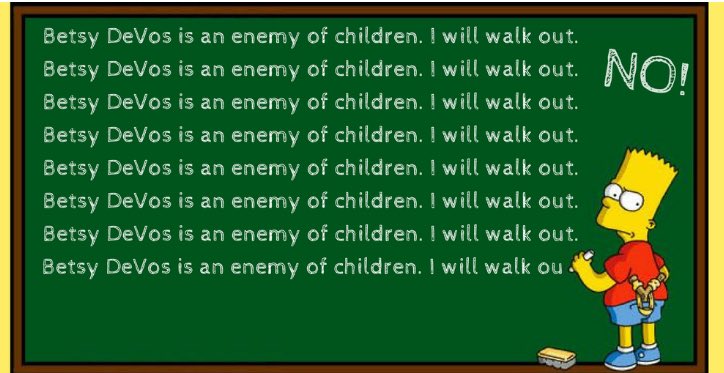February 6, 2017
Betsy DeVos is everywhere, filling up Twitter feeds and Facebook sidebars with links to the latest, most outrageous evidence of her desperation to become our next secretary of education.

The tabs on my computer are cluttered with articles describing DeVos’s criminally incompetent push to make our schools great again through unfettered privatization plans. She can be linked to ALEC, fraud and a personal disdain for public schools. She has created opportunities for scammers who want to make a “boatload of money” on public ed without the hassle of accountability. She has a prolific Friend of Betsy© in Ed Patru, and, when that is not enough, she has provided a way for other people to get paid to shill for her.
In our new, enticing world of alternative facts, DeVos will most likely be confirmed tomorrow, as the search for one more–just one more–“Republican with integrity” appears to have come to a Dark Money dead end.
But DeVos just might be the rock bottom this country needs to hit, in terms of our dependence on plutocrat-driven school privatization schemes. Her preference for an unregulated, unrestrained market of publicly funded private and religious schools, as well as charter schools, has embarrassed even her fellow billionaire buyers of influence and school choice–Eli Broad and Arthur Rock.
For years, Eli Broad’s name has been synonymous with the expedited take down of our nation’s public school system. Using wads of cash, and leaked secret plans, Broad has unleashed anti-union charter schools (high performing, always high performing) and a superintendent training academy for those with little to no background in public education. People like Betsy DeVos, for example. 
Rock, on the other hand, has occupied a quieter place in education reform while still wielding a DeVos-like level of undue influence. He is a venture capitalist from California who sits on Teach for America’s board of directors, has funded a sketchy chain of “blended learning” charter schools (Rocketship) and done his best to upend local school board elections around the country. In Minneapolis, for example, Rock has donated money to pro-reform school board candidates with connections to Teach for America. (And though Al Franken flayed DeVos for her ignorance around key education issues, he has also employed Teach for America alums as staffers–something Rock has funded)
Rock is an active philanthropist in education reform. From 2006 to 2008, Rock contributed $16.5 million to Teach for America. He also donated $1.5 million to Knowledge is Power Program (KIPP), the country’s largest network of charter schools.
–Angel Au-Yeung, Forbes, February 2017
If these guys don’t approve of DeVos, then we know something’s up. What separates DeVos from Rock and Broad, is, perhaps, her religious fervor, accompanied by a zest for vouchers. Vouchers, of course, would–in an idealized, free market world–make private schools eligible for public funding. In other words, they could threaten the market share Broad and Rock are trying to carve out through the expansion of charter school networks. (Beware! Vouchers are morphing into scholarship and “tax credit” bills.)
To be fair, Broad has also objected to DeVos’s devil-may-care embrace of for-profit charter schools, something Broad says he abhors. In a February 1 letter to Senate leaders Mitch McConnell and Charles Schumer, Broad touched on the most embarrassing moments of DeVos’s confirmation hearing. “We must have a Secretary of Education who believes in public education,” Broad wrote, before mentioning DeVos’s less than artful dodge on the question of whether or not schools should be gun-free zones.
In short, DeVos has created an opening for the likes of Broad and Rock, allowing them to position themselves as the moderate voice of education reform–despite their track records. DeVos is the unflattering mirror image of venture edu-philanthropists, and lurks as a no holds barred representative of the worst possible outcome (see Detroit) of their market-based reform plans.
Arne Duncan, Obama’s secretary of education, was not ideologically far from DeVos, yet stood as a kinder, gentler, Democratic version of her. He did not offend the way she does, but he should have. Or, to paraphrase Elizabeth Warren’s recent speech at the Congressional Progressive Caucus, our moment of crisis did not begin with Betsy DeVos’s nomination. We were already in crisis.
Education policy has been stuck in an Orwellian war on the “achievement gap” for decades, while public resources have mostly shrunk and segregation has increased. DeVos didn’t create that, though she has certainly capitalized on it. If her confirmation goes through as expected, the public–and policy makers–should capitalize on our awakened understanding of the cost of putting billionaires on a mission in charge of our schools.
No grant, no guru, no outside funding source. My work is entirely funded by my very kind and generous readers. Thank you to those who have already donated!
[Exq_ppd_form]
